|
|
|
Sort Order |
|
|
|
Items / Page
|
|
|
|
|
|
|
| Srl | Item |
| 1 |
ID:
159378
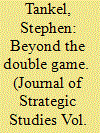

|
|
|
|
|
| Summary/Abstract |
States commonly take one of three approaches to militant groups on their soil: collaboration; benign neglect; or belligerence. All three approaches are present in Pakistan, where some groups also move back and forth among these categories. I employ the term “coopetition” to capture this fluidity. The dynamic nature of militancy in Pakistan makes the country an excellent laboratory for exploring a state’s assessment of the utility an Islamist militant group offers, and the threat it poses relative to other threats informs the state’s treatment of that group. In this article, I put forward a typology that situates Islamist militants in Pakistan in one of the above four categories. I also illustrate how a group’s identity, objectives, and alliances inform assessments of its utility and threat relative to other threats. In addition to enhancing our understanding of militant–state dynamics, this taxonomy builds on and helps to unify earlier typologies of Pakistani militancy.
|
|
|
|
|
|
|
|
|
|
|
|
|
|
|
|
| 2 |
ID:
126877
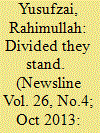

|
|
|
|
|
| Publication |
2013.
|
| Summary/Abstract |
As fissures on both the government and the militants side, serious doubts are being expressed about whether the dialogue between the two will materialise.
|
|
|
|
|
|
|
|
|
|
|
|
|
|
|
|
| 3 |
ID:
141295
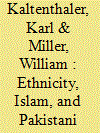

|
|
|
|
|
| Summary/Abstract |
This article argues that an Islamist militant group with a relatively homogenous ethnic make-up is more likely to be supported by those of the same ethnicity even if the group makes no reference to and even downplays the importance of ethnicity. Using survey data from an original survey carried out in Pakistan in 2013, with 7,656 respondents, this hypothesis is tested in a multiple regression analysis of support for the Pakistani Taliban. The results demonstrate that co-ethnicity between the respondent and the Islamist militant group is the most important predictor of support for the militant group.
|
|
|
|
|
|
|
|
|
|
|
|
|
|
|
|
| 4 |
ID:
132445
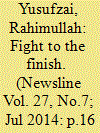

|
|
|
| 5 |
ID:
157091


|
|
|
|
|
| Publication |
New Delhi, Oxford University Press, 2016.
|
| Description |
xxiv, 212p.: ill.hbk
|
| Standard Number |
9780199468249
|
|
|
|
|
|
|
|
|
|
|
|
Copies: C:1/I:0,R:0,Q:0
Circulation
| Accession# | Call# | Current Location | Status | Policy | Location |
| 059270 | 297.72/SHE 059270 | Main | On Shelf | General | |
|
|
|
|
| 6 |
ID:
116613
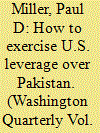

|
|
|
|
|
| Publication |
2012.
|
| Summary/Abstract |
The United States has more leverage over Pakistan than is widely appreciated, and it is time for American policymakers to use it. Since 2001, two successive administrations have tried to persuade Pakistan to end its support for militants-including the Afghan Taliban and the Haqqani network-exclusively through aid, diplomacy, and persuasion with few sanctions or conditions: an approach of all carrots and no sticks. They did so in the belief that Pakistan's fundamental problem was a lack of capacity, not will. They were wrong.
|
|
|
|
|
|
|
|
|
|
|
|
|
|
|
|
| 7 |
ID:
104413
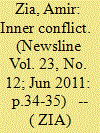

|
|
|
| 8 |
ID:
127284


|
|
|
| 9 |
ID:
100297
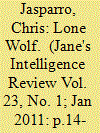

|
|
|
| 10 |
ID:
115595
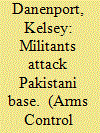

|
|
|
| 11 |
ID:
091809
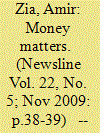

|
|
|
|
|
| Publication |
2009.
|
| Summary/Abstract |
The decentralised networks of militant groups have many sources of generating funds, including local and foreign Islamic charities, bank robberies and kidnappings for ransom, mainly in Karachi.
|
|
|
|
|
|
|
|
|
|
|
|
|
|
|
|
| 12 |
ID:
092189
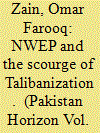

|
|
|
|
|
| Publication |
2009.
|
| Summary/Abstract |
Pakistan today is confronted with two insurgencies on its flanks in the north-west and the south-west.The Baloch insurgency in Balochistan and Pakistan insurgency in the North-West Frontier Province (NWFP) are qualitatively different in several respects, yet they represent the same version or justification for their ethnic sub-nationalism and religious reassertion against the centre.
|
|
|
|
|
|
|
|
|
|
|
|
|
|
|
|
| 13 |
ID:
187460
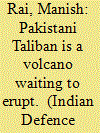

|
|
|
| 14 |
ID:
129310
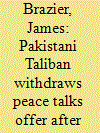

|
|
|
| 15 |
ID:
107586
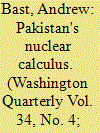

|
|
|
| 16 |
ID:
107898
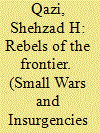

|
|
|
|
|
| Publication |
2011.
|
| Summary/Abstract |
The Pakistani Taliban, factionalized into some 40 groups, form a decentralized insurgent movement, often characterized by infighting, divergent motivations, and a shifting web of alliances. The Pakistani Taliban remain little understood because most scholars have avoided a serious treatment of the insurgent movement and instead focused on analyzing the geopolitics of the region and Pakistan's 'double game'. This article seeks to fill this gap by dissecting the movement through selected theories of organization and mobilization. First, I explain the various dimensions of the conflict and the origins of the insurgency. Next, I discuss the Pakistani Taliban's political organization, categorizing it as composed of various warlord regimes. I further list the Taliban's component groups and numerical strength and chart the leadership structure. Lastly, I analyze insurgent recruitment strategies, accounting for the role of selective incentives, coercion, and genuine grievances.
|
|
|
|
|
|
|
|
|
|
|
|
|
|
|
|
| 17 |
ID:
116606
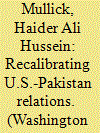

|
|
|
|
|
| Publication |
2012.
|
| Summary/Abstract |
Afghanistan is America's longest war. Thousands of U.S. troops and those from nearly 50 other countries have fought in Afghanistan against Taliban and al-Qaeda forces, but it was in nuclear-armed Pakistan where Osama bin Laden was killed, Khalid Sheikh Mohammad (the mastermind of 9/11) was captured, and Afghan Taliban leader Mullah Omar as well as the heads of the virulent Haqqani network reside. Pakistan's duplicity is a fact, yet it is often excessively characterized as a function of the India-Pakistan rivalry. Pakistani generals do fear India, but they have also recognized the threat from domestic insurgents. The height of this concern was reached in 2009, when the Pakistani Taliban were 60 miles from the country's capital and jeopardized U.S. as well as Pakistani goals in the region: interdicting al-Qaeda, protecting Pakistani nuclear weapons, and stabilizing (and in Pakistan's case, an anti-India) Afghanistan. At that point, Pakistani troops, unlike past attempts, fought back and prevailed against the insurgents. It can be done.
|
|
|
|
|
|
|
|
|
|
|
|
|
|
|
|
| 18 |
ID:
132197
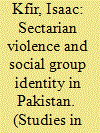

|
|
|
|
|
| Publication |
2014.
|
| Summary/Abstract |
Individual basic security is limited in Pakistan as the state is institutionally weak. One way to attain basic security is by joining groups who provide security and services. Consequently, groups not part of the political mainstream, to attract a following, must therefore show that they are sufficiently powerful to obtain concessions from established actors. Thus, by engaging in violence primarily of a sectarian nature, the Pakistani Taliban sustains itself as a unified force while also highlighting that it is a powerful group, which in turn it hopes would enable it to curve a political space and win concessions from the established elite. Using social group identity theory, club goods, and the economics of extremism, the article highlights why the Pakistani Taliban has increasingly attacked minorities and why more must be done to address sectarian violence.
|
|
|
|
|
|
|
|
|
|
|
|
|
|
|
|
| 19 |
ID:
086736


|
|
|
|
|
| Publication |
2009.
|
| Summary/Abstract |
Unravelling the Taliban phenomenon has never been easy, but it has undoubtedly become more complex with the rise of the Pakistani Taliban in 2003, making it necessary to differentiate this group from the Afghan Taliban. The former constituted the 'original' Taliban, militants who captured power in Afghanistan against heavy odds in 1996 by fighting and defeating the mujahideen who had earlier waged jihad, or holy war, to oust the Soviets. But members of the Afghan Taliban have been vigilant, regrouping after the ouster of their regime in Afghanistan in December 2001 as a result of the post-11 September 2001 invasion by the US. Indeed, militants with the Afghan Taliban are now resurgent, and pose a tough challenge to troops from 41 NATO and non-NATO countries, including the US, United Kingdom, France and Germany.
|
|
|
|
|
|
|
|
|
|
|
|
|
|
|
|
| 20 |
ID:
086081
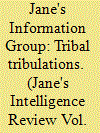

|
|
|
|
|
| Publication |
2009.
|
| Summary/Abstract |
Pakistan's once little-known Federally Administered Tribal Areas (FATA) region has steadily risen to international prominence following the 2001 US-led invasion of Afghanistan. Of the seven tribal agencies that comprise the FATA, North and South Waziristan have become the Afghan Taliban's main sanctuary and training ground, and the nucleus of the Pakistani Taliban movement. The Pakistani Taliban plays a key enabling role in cross-border attacks on coalition and Afghan troops in Afghanistan, as well as ensuring that the region remains a critical haven for the Afghan Taliban and its foreign allies.
Image: Pakistani artillery fire towards militant positions in the Federally Administered Tribal Areas on 27 November 2008. Pakistan's counter-insurgent campaign has occurred concurrently with US unmanned aerial vehicle strikes on militants in the region
|
|
|
|
|
|
|
|
|
|
|
|
|
|
|
|
|
|
|
|
|